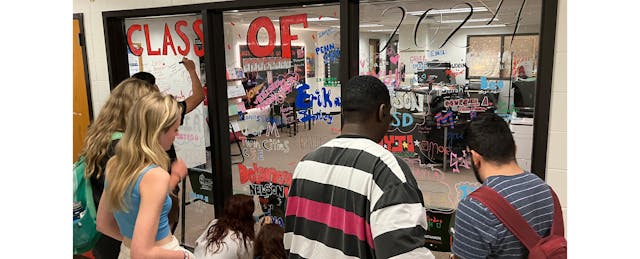ST. PAUL, Minn. — At the end of each school year at Central High School, seniors grab a paint pen and write their post-graduation plans on a glass wall outside the counseling office.


For many, that means announcing what college they’ve enrolled in. But the goal is to celebrate whatever path students are choosing, whether at a college or not.
“We have a few people that are going to trade school, we have a few people that are going to the military, a few people who wrote ‘still deciding,’” said Lisa Beckham, a staffer for the counseling center, as she helped hand out markers in May as the school year was winding down. Others, she said, are heading straight to a job.
Talking to the students as they signed, it was clear that one factor played an outsized role in the choice: the high cost of college.
“I’m thinking about going to college in California, and my grandparents all went there for a hundred dollars a semester and went into pretty low-paying jobs, but didn't spend years in debt because it was easy to go to college,” said Maya Shapiro, a junior who was there watching the seniors write up their plans. “So now I think it is only worth going to college if you're going to get a job that's going to pay for your college tuition eventually, so if you’re going to a job in English or history you might not find a job that’s going to pay that off.”
When I told her I was an English major back in my own college years, she quickly said, “I’m sorry.”
Even students going to some of the most well-known colleges are mindful of cost.
Harlow Tong, who was recruited by Harvard University to run track, said he had planned to go to the University of Minnesota and is still processing his decision to join the Ivy League.
“After the decision it really hit me that it's really an investment, and every year it feels like it's getting less and less worth the cost,” he said.
A new book lays out the changing forces shaping what students are choosing after high school, and argues for a change in the popular narrative around higher education.
The book is called “Rethinking College,” by longtime journalist and Los Angeles Times opinion writer Karin Klein. She calls for an end to “degree inflation,” where jobs require a college degree even if someone without a degree could do the job just as well. And she advocates for more high school graduates to take gap years to find out what they want to do before enrolling in college, or to seek out apprenticeships in fields that may not need college.
But she admits the issue is complicated. She said one of her own daughters, who is now 26, would have benefitted from a gap year. “The problem was the cost was a major factor,” Klein told me. “She was offered huge financial aid by a very good school, and I said, ‘We don’t know if you take a gap year if that offer is going to be on the table. And I can’t afford this school without that offer.’”
Hear more from Klein, including about programs she sees as models for new post-grad options, as well as from students at Central High School, on this week’s EdSurge Podcast. Check it out on Spotify, Apple Podcasts, or on the player below. It’s the latest episode of our Doubting College podcast series.
Get episode reminders and show notes in your inbox. Sign up for the EdSurge Podcast newsletter.


